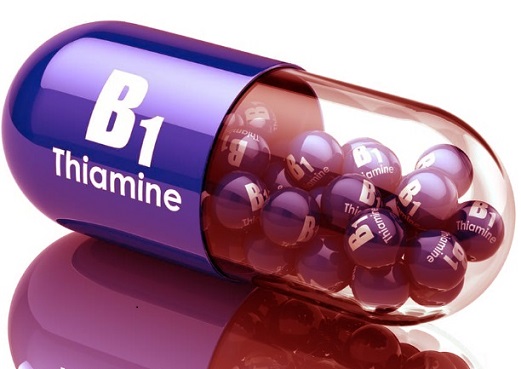Nikhil Prasad Fact checked by:Thailand Medical News Team Jan 06, 2025 3 months, 2 weeks, 6 days, 4 hours, 29 minutes ago
Medical News: Thiamine, also known as vitamin B1, is essential for maintaining brain health, nerve function, and carbohydrate metabolism. Despite its importance, deficiencies in this nutrient are often overlooked, especially in non-alcoholic populations. Recent research conducted by a team from Henry Ford Health, Michigan State University, and Advocate Christ Hospital-USA, highlights the prevalence of thiamine deficiency among oncology patients visiting emergency departments (EDs). This
Medical News report sheds light on the study's findings and their implications for healthcare professionals and patients alike.
 Thiamine Deficiency in Emergency Oncology Patients
Study Focus and Methods
Thiamine Deficiency in Emergency Oncology Patients
Study Focus and Methods
The study aimed to explore the frequency of thiamine deficiency in acutely ill oncology patients compared to individuals without cancer. Conducted as a single-center prospective cohort investigation, the research involved 87 oncology patients and 71 matched control participants without cancer. The controls were paired based on age and sex, and participants with a history of alcohol use or prior thiamine administration were excluded to ensure clarity in results.
Researchers collected blood samples to measure thiamine levels and analyzed other clinical variables, including mortality and diagnoses of delirium or Wernicke's encephalopathy. This systematic approach enabled the team to identify significant gaps in the recognition and treatment of thiamine deficiency among cancer patients in emergency settings.
Key Findings
The study revealed startling statistics. Nearly 29 percent of oncology patients exhibited thiamine deficiency, a stark contrast to only 8.5 percent of controls. This equates to more than a threefold increased risk for cancer patients. Despite this high prevalence, none of the deficient oncology patients received thiamine supplementation during their ED visits.
Among the oncology cohort, common cancers included lung (25 percent), colon (23 percent), prostate (10 percent), and breast (9 percent). These patients also showed higher incidences of anemia and hypoalbuminemia, which may contribute to their vulnerability to thiamine deficiency. Furthermore, thiamine-deficient oncology patients experienced higher, albeit statistically insignificant, rates of delirium and mortality within 60 days.
Why Thiamine Deficiency Is Common in Cancer Patients
Cancer and its treatments impose significant metabolic demands on the body. Poor dietary intake, increased energy requirements, and the rapid consumption of nutrients by tumors collectively deplete thiamine reserves. Certain chemotherapy agents, such as 5-fluorouracil, further exacerbate this deficiency by interfering with thiamine metabolism.
This biochemical imbalance can have profound consequences. Wernicke's encephalopathy, a severe neurological disorder, is a potential outcome of untreated thiamine deficiency. Although none of the study's oncology participants were formally diagnosed with this condition, its symptoms may have gone unnoticed or
unreported in the busy ED setting.
Implications for Emergency Care
The findings highlight an urgent need for improved screening and management of thiamine deficiency in oncology patients. Current practices often overlook this issue, potentially worsening patient outcomes. Emergency departments could benefit from adopting point-of-care diagnostic tools or clinical decision-support systems to identify at-risk individuals. Additionally, routine thiamine supplementation for cancer patients presenting with acute illness could prevent complications associated with deficiency.
Conclusion
The study underscores the critical importance of addressing micronutrient deficiencies in cancer care. Thiamine deficiency is both common and underdiagnosed among oncology patients in emergency settings, posing significant risks to their health and recovery. To mitigate these risks, healthcare providers must prioritize nutritional assessments and consider prophylactic thiamine supplementation for vulnerable populations.
The study findings were published in the peer-reviewed Journal of Clinical Medicine.
https://www.mdpi.com/2077-0383/14/1/257
For the latest Cancer News, keep on logging to Thailand
Medical News.
Read Also:
https://www.thailandmedical.news/news/breaking-past-cancer-studies-using-rodents-are-flawed-because-it-has-now-been-found-that-human-pd-1-functions-differently
https://www.thailandmedical.news/news/brigham-study-finds-that-more-than-50-percent-of-cancer-drugs-granted-accelerated-approval-by-u-s--fda-do-not-work-and-sometime-kills
https://www.thailandmedical.news/news/pharma-news-swedish-researchers-warn-that-many-cancer-drugs-are-being-approved-despite-lack-of-proper-efficacy
